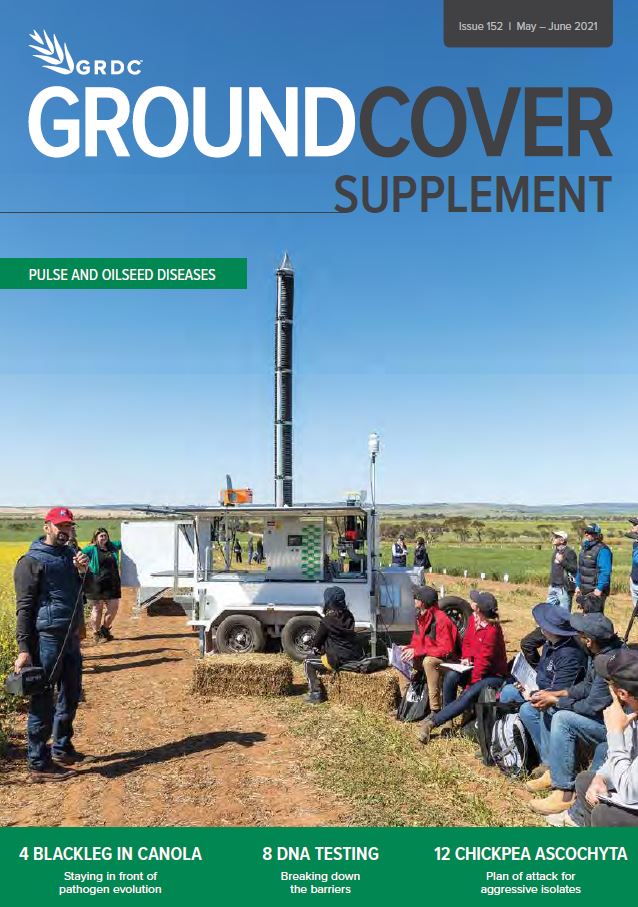This page shows the articles in of GroundCover.
GroundCover is also distributed every two months via mail. If you would like to subscribe to receive the hardcopy magazine, visit our subscription page.
Download supplement-

Keeping canola ahead of evolving blackleg
Supplement: Pulse and oilseed diseases, May-June 2021 - 2021-05-14T09:00:00+10:00Shifts in the efficacy of genetic resistance to blackleg and changing farm practices mean staying ahead of this evolving pathogen takes constant vigilance. Both early sowing and stubble retention practices have an impact on infection patterns and management practices.
-

Suppressing disease to protect break crops
Supplement: Pulse and oilseed diseases, May-June 2021 - 2021-05-13T09:00:00+10:00GRDC is targeting profitable disease management in pulses and oilseeds through active disease surveillance and diagnostics, pathogen biology, epidemiology (how diseases function in the environment), genetic solutions and the development of integrated disease management packages.
-

Summer crop disease breakthroughs
Supplement: Pulse and oilseed diseases, May-June 2021 - 2021-05-07T09:00:00+10:00For the first time, researchers in Queensland have identified an insect vector for phytoplasma in grain legumes. They have also discovered asymptomatic host crops for Fusarium wilt in mungbeans and quantified the interaction with root lesion nematode.
-

Australian approach needed for Sclerotinia
Supplement: Pulse and oilseed diseases, May-June 2021 - 2021-05-06T09:00:00+10:00Researchers are targeting sources of genetic resistance to Sclerotinia stem rot in canola germplasm. Management solutions tailored to Australian conditions are also being investigated.
-

DNA tests sharpen decision-making
Supplement: Pulse and oilseed diseases, May-June 2021 - 2021-05-05T09:00:00+10:00DNA testing is now providing new insights that will help identify diseases causing pathogens and understand more about their behaviour and spread. The same technology is also behind a breakthrough that will see a commercial test for rhizobium rolled out to growers and researchers in 2021.
-

Broadleaf rise adds to disease profile
Supplement: Pulse and oilseed diseases, May-June 2021 - 2021-05-03T09:00:00+10:00Viruses and Sclerotinia are two disease threats that have come under increased scrutiny in New South Wales in recent years. Both can easily fly under the radar with symptoms that are often indistinguishable from those caused by abiotic stress and herbicides.
-

Opportunities to expand blackleg resistance pool
Supplement: Pulse and oilseed diseases, May-June 2021 - 2021-05-02T09:00:00+10:00New research has identified three major resistance genes for blackleg in canola, developed markers, and is working to better understand how minor gene resistance is expressed. Screening shows that one of these major genes is present in most historic and many current Australian varieties.
-

Disease services support pulse management
Supplement: Pulse and oilseed diseases, May-June 2021 - 2021-05-01T09:00:00+10:00The SARDI pathology group has supported growers with a disease diagnostics service for accurate identification, disease surveillance and disease management advice. Information has included the timing of spore showers and how shifts in disease pathotypes impact on variety resistance.
-

Plan of attack for aggressive Ascochyta isolates
Supplement: Pulse and oilseed diseases, May-June 2021 - 2021-04-30T09:00:00+10:00Ascochyta blight in chickpea has become more aggressive against commonly grown chickpea varieties such as PBA HatTrick (PBR), Genesis™ 090 and PBA Seamer (PBR). Studies into pathogen biology are targeting opportunities to develop better resistance and management recommendations.
-

Genome sequencing leaves plant viruses no place to hide
Supplement: Pulse and oilseed diseases, May-June 2021 - 2021-04-25T09:00:00+10:00Researchers have developed an Australian first – a high-throughput genome sequencing diagnostic method for viruses in grains. The new method will support the quarantine and screening of imported germplasm and reduce the risk of introducing plant viruses into Australia.
























































